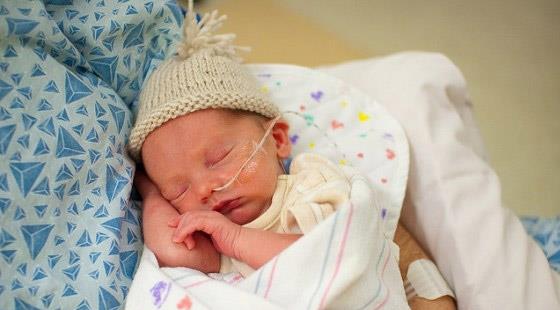Premature babies often experience many disadvantages during their development. The more preterm babies are, the more likely they are to have one or more serious health problems
Preterm babies usually have a much lower weight than normal babies, and that means they have less subcutaneous fat. This makes it easier for the baby to lose body temperature. Babies are also susceptible to hypoglycemia and hypocalcemia, conditions that can cause permanent brain damage. The earlier the baby is born, the more susceptible to respiratory failure because of the incomplete lungs, which can lead to death. If the oxygen levels are too high, premature babies can develop retinal fibrosis and become blind. Your baby also faces the risk of jaundice and cerebral jaundice, a life-threatening complication. These complications can be detected early and handled and monitored at the hospital.

Babies born prematurely have a high risk of infection and are susceptible to brain hemorrhage
Long-term health effects
When you take your premature baby home, you need to see that the dangers are still there. Be ready to help your baby whenever he needs you.
- Vision and hearing problems: 1 in 4 babies weighing less than 1.5kg at birth has a hearing loss. These newborn babies are also susceptible to retinopathy from premature birth. Babies need to be screened as soon as possible and treatment at this stage will be very effective.

30 tips to take care of children in the first 30 days of being a mother When your family welcomes another little angel, there are many new things that make you confused and mad when you first become a mother. 30 very useful and practical tips from experts and other mothers below will help you in the first time as a mother, shaping a public machine ...
Digestive problems: Premature babies often cannot breastfeed or bottle feed themselves, but are fed through a tube attached to the nose or mouth for several weeks. This leads to prolonged difficulty in feeding or feeding at a later stage. For cases of necrotizing enterocolitis or gastroesophageal reflux disease, the baby should be treated by a specialist.
Respiratory problems: Premature babies are more susceptible to asthma, laryngitis, and bronchitis compared to term babies. Some children have bronchopulmonary dysplasia, which leads to the baby needing oxygen for a long time.

Neonatal acute respiratory failure Acute respiratory illness is one of the most common illnesses in infants and young children, especially during hot and rainy days. This is also a disease that can cause your baby to go to the emergency room.
Neurological problems: Some premature babies have cerebral palsy, making it difficult for them to move. Depending on the severity or severity, this complication can also affect cognition.
In addition, premature babies also need their parents' support in learning to timely recognize if the baby is limited in ability to absorb and perceive.
>> Related topics from the community:
Helping mothers prevent premature birth
In case of injection of lung maturation drugs or premature birth before 35 weeks
MarryBaby














